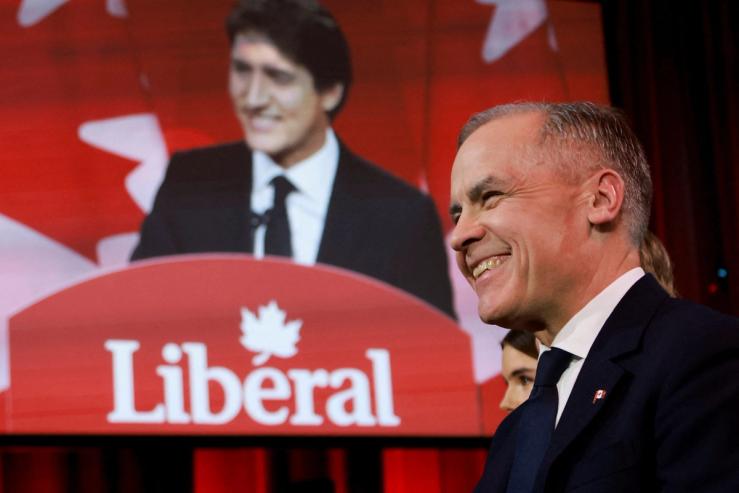The News
Canada’s Liberal Party elected Mark Carney as leader, propelling the former central banker who has never held office to become the country’s prime minister at a pivotal moment.
As Justin Trudeau’s successor, Carney will immediately be tasked with navigating a fractured relationship with US President Donald Trump, who has repeatedly threatened tariffs and even Canada’s sovereignty, before having to steer the party through national elections later this year.
Carney long seen as the frontrunner, was “both the riskiest choice and the safest,” Canadian journalist Andrew Cohen wrote in The Globe and Mail before the election results were announced: Carney’s economic know-how makes him well suited to take on Trump, analysts said.
SIGNALS
Canada’s Liberal party gets a ‘Trump bump’
While Canada’s Liberal Party has long languished in the polls, President Donald Trump’s non-stop attacks on the US’s northern neighbor have caused a dramatic turnaround in the ruling party’s prospects. The party has reversed a 20-point polling deficit, a comeback with no comparison in Canada’s modern history, one expert told The Washington Post. “Donald Trump is going to be the uninvited guest in the next Canadian election,” a pollster said, noting that his attacks may well shape who wins the next vote. The Liberals’ rise is not only driven by Trump’s attacks, The Economist noted, but is also motivated by Trudeau’s departure. The Canadian leader’s popularity had gradually slumped in recent years, and voters quickly began returning to the Liberals after his resignation.
Conservatives’ Trump connection could become a liability
Despite the Liberals’ changing fortunes, the Conservatives have consistently maintained a lead in the polls. However, party leader Pierre Poilievre’s backing from high-profile Trump allies such as Elon Musk could become a liability for him given the surge of anti-American sentiments that Trump’s tariffs and rhetoric have unleashed. “I think he’s going to have to differentiate himself from Mr. Trump, much more than he was planning to. His opponents, of course, will accuse him of being Trump-lite,” an expert on Canadian politics told The New York Times. The party has also had to shift its message on the fly, adopting a “Canada-first approach” that marks a break from its previous rhetoric that the country is broken. “Now they have to say: ‘Well, it is but we still really love it,’” a Canadian analyst said.
Canada’s intelligence agency warns of growing AI threat
Ahead of Canada’s elections this year, one of the country’s intelligence services has warned of the growing threat of interference from artificial intelligence. China is “likely” to use AI to “push narratives favourable to its interests and spread disinformation among Canadian voters,” the Communications Security Establishment Canada warned, noting that Russia or Iran could use “low-effort cyber or influence operations.” This threat is also likely to grow in coming elections, as hostile actors continue to collect “billions of data points on democratic politicians, public figures, and citizens” that will allow them to rapidly improve their ability to conduct targeted influence campaigns, the agency warned.


